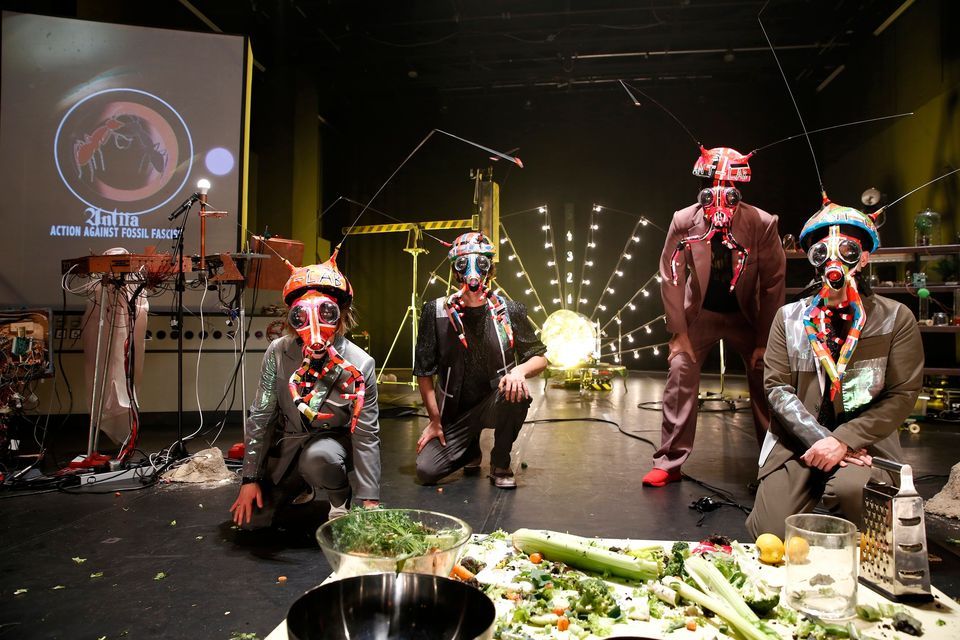
After being postponed twice, andcompany& Co’s new production Global Swarming – The Science of the Antz finally opens at HAU this month. What can you tell us about it?
For almost a year now, [we’ve been] super fascinated by ants. We’ve turned into ant nerds. It started with a fascination for swarm intelligence, what’s been called ‘super organisms’, in reference to the ants. We’re even thinking about changing our name to ‘Antcompany’. We found out that scientists are really excited about the role of ants to regulate the climate. Ants can really help to cool down the planet.
Scientists even speculate that they did in the beginning, because this geological process of weathering – when giant rocks turn into sand through wind and water over long periods time – the scientists found out that ants are involved, and this whole process sped up. And because of the weathering, carbon dioxide gets stored in the ground. We thought, ‘this is amazing!’ Some ants even have the ability to track carbon dioxide in the air. So I thought we should get in touch with the ants, but maybe they wouldn’t care about us, because they’ve been here for hundreds of millions of years.
For them, we’re just annoying babies and they’re probably looking forward to when we’re gone again. Our work is always very much shaped by collaborations, that’s what the original name ‘andcompany&company’ is about. This collaboration is with Noah Fisher again, a visual artist from New York. He built a ‘performative laboratory’ for us where we wanted to turn into ants. We celebrate our transformation.
We needed an Antifa against fossil fuels, but we didn’t know what it would be.
Do you think that global warming is the biggest threat facing humanity?
Until the end of February this year, I would have said yes. I think that the climate crisis and the [Ukrainian-Russian] war are related, because the Russian Federation is an old fossil fuel power. And that’s one of the reasons why they are so aggressive, because the threat of renewable energy is a threat to [Russia’s] security. Sometimes I think it was good that our piece got postponed twice because of corona. We were going in that direction, playing with the meaning of ‘ant’ in Antifa. So we needed an Antifa against fossil fuels, but we didn’t know what it would be.
I think there’s an interesting parallel between ants and humans, because they are social insects. They also have language and are super cooperative. For a long time, people thought ants were fascists or super communist, but now they realise they are very flexible. They can change their appearance. If they realise they need more workers for certain jobs then they transform. But there’s new research that suggests ants are not the workaholics that we thought they were, that two thirds of the ants run around and don’t do anything. Maybe that’s the secret.
How has the collaborative process with Noah Fisher been?
Andcompany&Co has been working with Noah for about 16 years, since the very beginning of the group. He was very involved with the Occupy Wall Street movement and he became almost a mascot for it. I’m talking with Noah a lot about the war. He also got me in contact with Ukrainian, Polish, Belarusian and some Russian artists and activists. For me, it’s very important to listen to Ukrainian voices and not do “Westsplaining” about the war.
Have you rewritten the piece at all since the start of the war?
It will change a lot. There was a big pause because I was very busy with the Volksbühne. I tried to split myself in half, but it’s not really working because both are really full-time jobs. Especially because after the war began I started a new series at the Rote Salon, in addition to the one I was doing anyway, and that pushed me pretty much to the limit.
Humans can be so smart individually, but in bigger groups they tend to get dumber and dumber.
This is not the first piece you’ve done tackling climate change…
During the first lockdown we made a piece that René Pollesch will redo, and we will be the dramaturges, as a group. We found a not very well-known piece by Heiner Müller (Neue Horizonte: Eternity für alle) that was based on a play aboutworkers in an oil refinery and developed 50 years ago. The refinery was also where computers were connected for the first time. We found it pretty interesting and I started researching if it still exists. I thought it was closed down, but it still exists in a small city called Schwedt near the Polish border.
And two thirds of the gasoline from Berlin and the airports come from this refinery because there are 5000km of pipelines, called druschba, meaning ‘friendship’, from Siberia. And now it’s in the headlines almost every second day because if they close this refinery down Berlin will be out of gas. We just toured with this piece again, and showed it in our home city of Frankfurt am Main just two weeks ago.
What can humans learn from ants?
The question is how do the ants manage to be so smart together and be so dumb individually and that is the main difference: that humans can be so smart individually, but in bigger groups they tend to get dumber and dumber. So how can we reverse this process – this is really a problem we need to solve quickly.
- Global Swarming – The Science of the Antz June 9-12, HAU2


